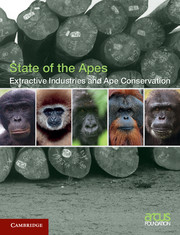Summary
Apes, including gorillas, chimpanzees, bonobos, orangutans and gibbons, inhabit tropical forests across Africa and Asia. The alarming rate at which these forests are disappearing, due to deforestation and land degradation, is cause for global concern. Forest loss is one of the factors linked to climate change, which is resulting in a range of impacts on our planet. Forests also secure a host of important ecosystem services, as well as providing a habitat for a rich biodiversity of species. Charismatic species such as apes can act as ambassadors for these important forests. Apes also serve to illustrate our link to all other species on this planet. The shared evolutionary linkages between humans and non-human apes, and the similar genetic make-up and physiology are evident in our shared behaviors and intelligence. The conservation and protection of apes is of paramount importance as we look to secure the futures of humans, biodiversity and the planet.
The 2013 State of the Apes report is the first in a series, and unprecedented not only in its presentation of the current status of great apes and gibbons globally but also in demonstrating our understanding of how the survival of apes is impacted by extractive industry practice. The report discusses the relationship between global, national and local processes that interact with extractive industry activity and ape conservation.
- Type
- Chapter
- Information
- Publisher: Cambridge University PressPrint publication year: 2014



